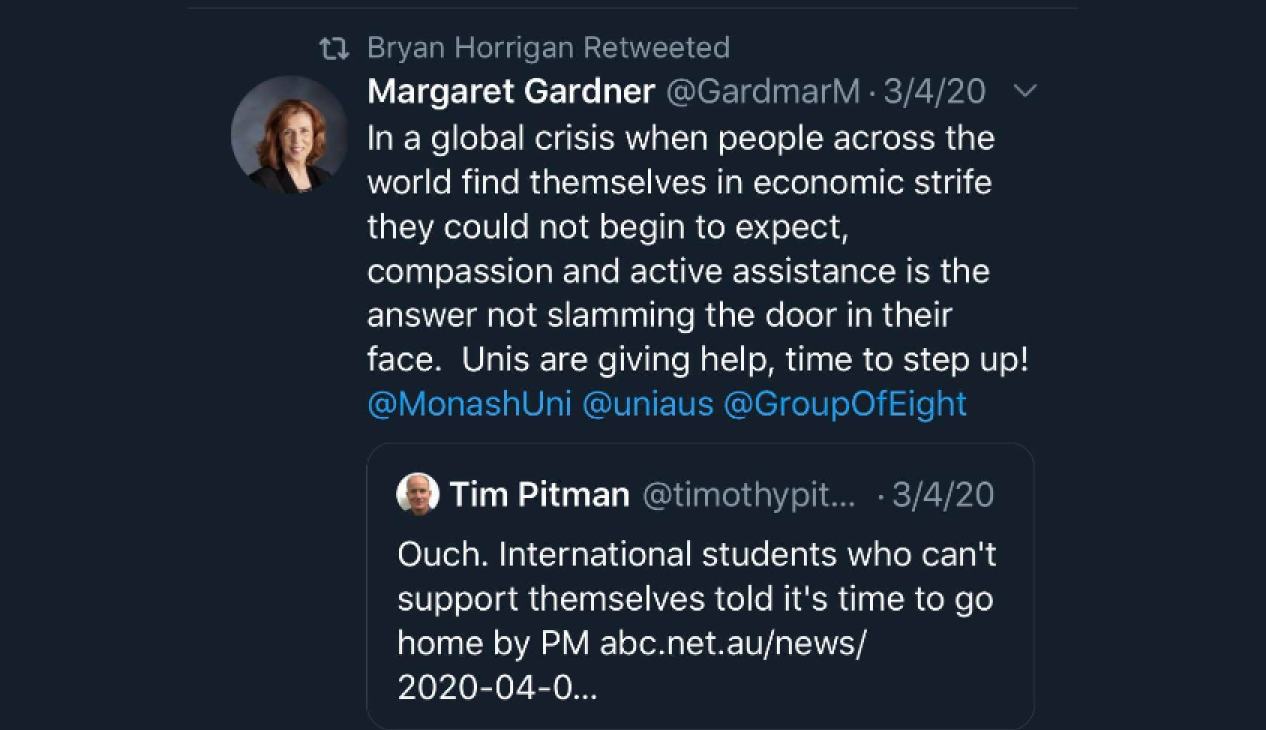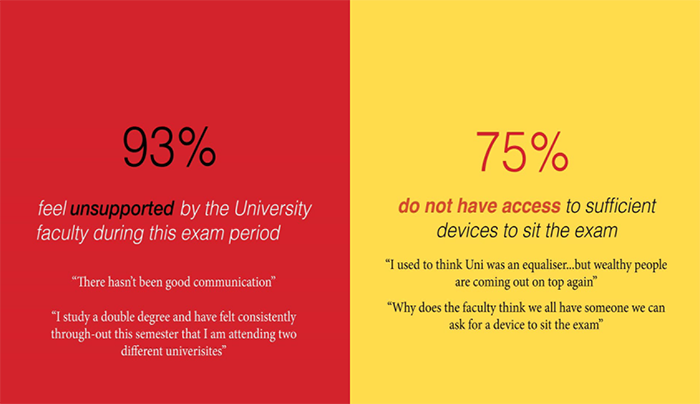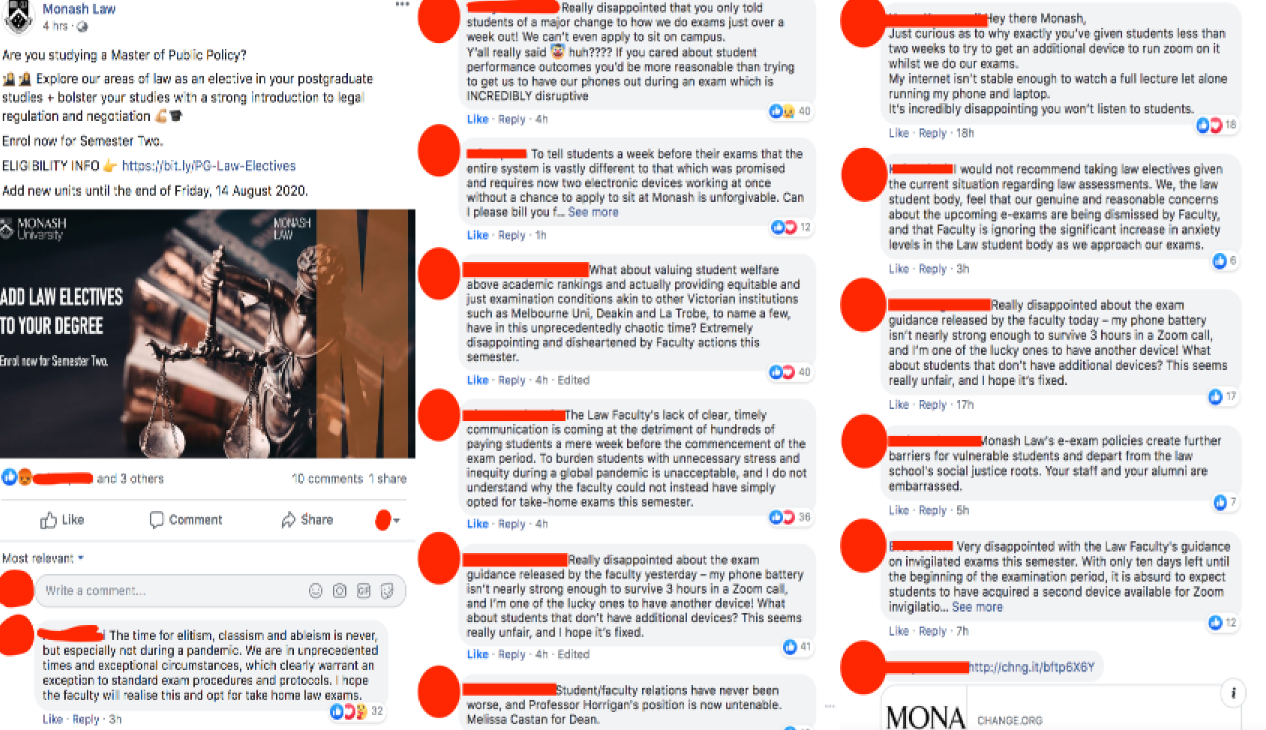Powered by MOMENTUM MEDIA
In disputing exam conditions set out during the coronavirus pandemic, law students of Monash University have protested against the faculty with a petition, a survey and over 1,000 “disappointed” students. Lawyers Weekly takes a deeper look at this ongoing battle between the students and the Melbourne law faculty.

On Monday, 15 June, Lawyers Weekly wrote that over 980 students had registered distress and frustration with Monash University’s new exam protocols. In a petition, students called the decision “elitist, classist and ableist”, referring to the university’s intention to watch students and requesting that they have multiple devices ready for the duration.
“The response has been extremely disappointing,” said law student Scott Walker. “It’s been essentially a non-response and repeated statements, to then rehash and hit the ‘reply all’ to students [so they can] copy and paste a generic response. It is essentially that ‘we’re supporting you, but academic integrity is more important’.”
While disappointed with the university’s approach to the exams, the overall frustration has been in the way the faculty has responded to student concerns. One law student, who got in touch with Lawyers Weekly, pointed out a tweet from the Monash Law dean Bryan Horrigan only highlighted the “obvious hypocrisy” of the law faculty.
This tweet – which, to clarify, was only retweeted by Mr Horrigan and seemingly taken off his timeline later – was written by the president and vice-chancellor of the university Margaret Gardner: “In a global crisis when people across the world find themselves in economic strife they could not begin to expect, compassion and active assistance is the answer, not slamming the door in their face. Unis are giving help, time to step up!”

Response from Monash University
In a statement supplied to Lawyers Weekly, a spokesperson from the university noted that the ability to respond to “complex legal issues” in the “time-sensitive environment” is critical for law graduates to ensure they are prepared for their future careers.
“A supervised exam ensures all students have a consistent opportunity to succeed on the exams and they are conducted in a fair and ethical manner. Remote monitoring is being used to protect students by removing the possibility of students gaining an unfair advantage over others and undermining everyone else’s hard work,” the spokesperson said.
The concerns from the petition included that students had already been permitted their open-book exam and that they completed in-semester quizzes and assessments from the privacy of their home without surveillance equipment. On top of that, law students have already completed their Lawyers Ethics exam as a take-home process.
In response to this, the university said that many assessments had been altered with the intention of accommodating the pandemic. However, there are some units where a supervised exam is “necessary to ensure students are able to evaluate their content and satisfy learning requirements”, which is critical to learning outcomes.
“No one is saying academic integrity is not important but to prioritise academic integrity over student wellbeing and mental health is an interesting choice,” said Mr Walker. “If academic integrity is so important, why are we still allowed to assignments at home in the traditional manner? Why is Lawyers Ethics a take-home exam?
“This seems like there are huge double standards and it doesn’t make sense that other law schools around Victoria and the Legal Admissions Board have another path.”
Monash vs other Melbourne law schools
Speaking of, another concern from the petition was that the Victorian Law Admissions Board (VLAB) waived its usual exam requirements in light of COVID-19, which meant that other universities had changed how they conduct exams. The students said there was no reason Monash needed their own new standards, in light of this.
In response to this, Monash University said the majority of assessments do not include a supervised exam and many were altered to accommodate the coronavirus.
The university added that the VLAB stated they “prefer online exams” which are looked at as being supervised remotely. This supports the university’s commitment to academic integrity and high-quality learning outcomes, the spokesperson said. They added that the university deems a supervised examination to be the “most effective method” for evaluating the course content and satisfying the learning outcomes.
In comparison, another law student asked that Lawyers Weekly take a look at Deakin University, another Melbourne institution of which there is “strong competition”.
According to the message from Deakin Law School dean Professor Jenni Lightowlers, students at the rival university will have online take-home exams that they have 24 to 48 hours to complete. There will also be longer durations, offered by Monash too.
A Facebook page for Monash University students noted: “We’re particularly concerned about the requirements it will pose upon law students to be invigilated via Zoom on a second device, while faculties around the country have disregarded similar measures.”
Deterioration of trust in Monash
Monash students designed a survey that found 93 per cent of students who responded felt unsupported by the university faculty during the exam period and 73 per cent said they felt significant mental health distress. Almost 100 per cent said they were mostly concerned about the internet and 75 per cent said they did not have adequate devices.

Due to these ongoing concerns, many students – including Mr Walker – said that they would be hesitant in recommending Monash for future students. As part of the survey, almost 50 per cent said they were considering moving universities.
“I think the teaching staff are great and I do recommend on that basis – but in terms of being caring of their [students’] wellbeing, responding to students, being open and being transparent, I think I would have to say there are other universities in the state which [respond] to students in a more appropriate and respectful manner,” Mr Walker said.
In comments posted under Monash’s Law Facebook page, a group of other students expressed their concern and their hesitancy in recommending Monash in the future to high school or interchanging students. One student commented: “What about valuing student welfare above academic rankings and actually providing equitable and a just examination condition akin to other Victorian institutions, such as Deakin.”

At the end of the day – on top of requesting a change to the exam conditions – students are after more transparency and more accountability from their university.
“It would be nice to have an open dialogue with the faculty – which isn’t just the stock-standard response,” Mr Walker said. “I think the way law students have mobilised on these issues shows a widespread dissatisfaction on the way they are handling this.”

Naomi Neilson is a senior journalist with a focus on court reporting for Lawyers Weekly.
You can email Naomi at: